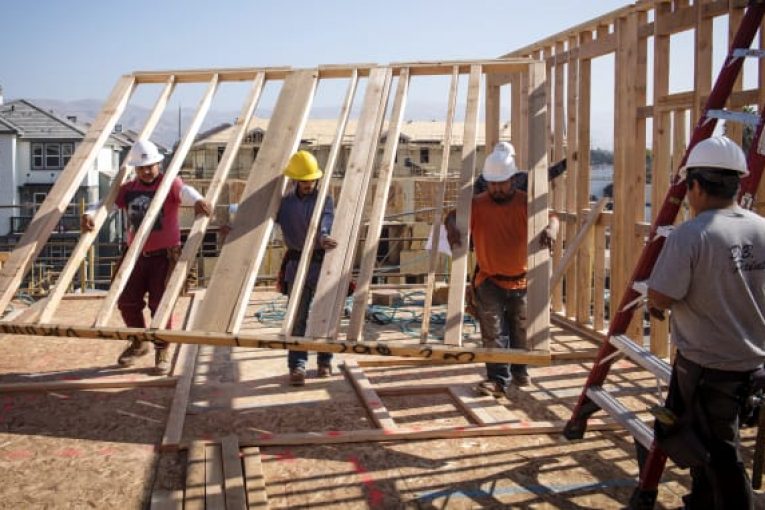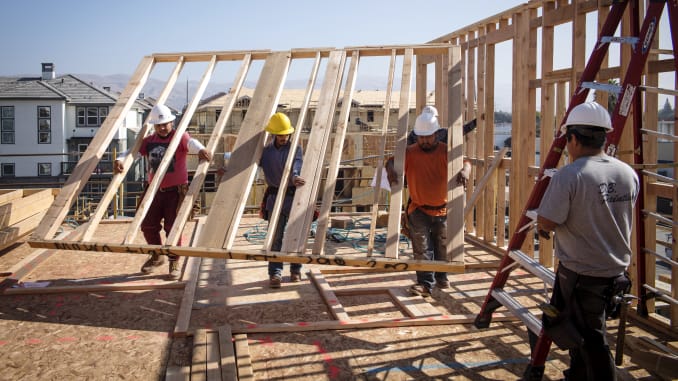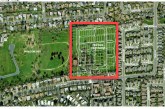

Eric Jaye, in a special column in the Sacramento Bee, argues the need to stand up to powerful developers as well as his opposition to SB 50—but like most critics, he fails to offer much in the way of alternatives to the measure that attempted to jumpstart housing.
The flashpoint of the housing debate right now in California “is Senate Bill 50 by state Senator Scott Wiener.”
Mr. Jaye argues: “Flush with cash in his campaign account raised from real estate developers, Wiener claims the moral high ground on his legislation to give developers the right to tear down the house next to you and build luxury housing towers right up to your lot line.
“The facts are indisputable,” Mr. Jaye admits, “California faces an affordable housing crisis. Wiener has focused on a real problem. But his bill to turn housing policy over to his developer donors will not solve that problem.”
Here we get to the crux the argument.
First he argues that, for all the moral posturing and ad hominem attacks, Senator Wiener exempted Marin County, “one of the wealthiest counties in the country, to help win approval of his plan. He’s playing raw politics and pretending it’s a moral crusade.”
The truth is that Senator Wiener was attempting to count votes and make enough concessions to win. As it turned out, there were too many people on the fence and the vote itself was probably too divisive to do so. I’m not sure his efforts to do so necessarily should discredit him.
Second, Mr. Jaye takes issue with the notion that the plan is “transit-oriented,” arguing that “there is no new fiscal support for mass transit in the bill.” Fair point, although it is also probably  fair to point out he is dealing with the housing end of the equation, not necessarily the transit end.
fair to point out he is dealing with the housing end of the equation, not necessarily the transit end.
Mr. Jaye tips his hand, though, that this is not merely an impartial analysis, arguing that “the new luxury housing he demands will create even more traffic gridlock and all the misery that comes with it.”
That’s a lot of loaded words without a lot of evidence to back it up. Mr. Jaye correctly points out that there is not a lot of room on most transit systems at rush hour, but, then again, neither is there a lot of room on highways or surface streets. Putting housing near work and transit lines is smart development—utilizing impact fees and state funding to improve these systems is obviously a needed innovation—but the state is attempting to deal with a housing crisis first. The need to deal with transportation is also there, but doesn’t necessarily have to come concurrently.
Third, Mr. Jaye writes that Senator Wiener “blames his constituents for the problem while deflecting the culpability of the state government where he now serves.” He correctly points out that Sacramento “took away redevelopment funds that were used to build affordable housing.”
As I have written several times, I see a reinstatement of redevelopment, or a comparable funding formula using increment taxes as a necessary compendium to a housing bill along the lines of SB 50. With the reinstatement of redevelopment money, the state can once again demand higher percentages of affordable housing.
Fourth, Mr. Jaye writes that “while he and his supporters attack single-family homeowners as selfish, he neglects to acknowledge that California has just essentially doubled density in single-family neighborhoods by allowing Accessory Dwelling Units (ADU) virtually as a right.”
I don’t really have a problem with ADUs as a way to increase density. I would not argue that this equals doubled density. Moreover, it is not clear what any of this has to do with SB 50.
Finally, “while Wiener has added some protections for low-income communities to avoid displacement, they are grossly inadequate.” That’s a fair criticism.
Eric Jaye concludes: “Standing up to powerful developers isn’t deplorable – it is laudable.”
Okay, fine. Smack the developers around. But what is to me most notable in this criticism of SB 50 is there is no plan on how to address what Eric Jaye himself acknowledges as a critical problem—a lack of affordable housing.
In fact, instead of beating a dead horse, it would have been nice if he had suggested either improvements to SB 50 to make it more viable, or proposed his own way forward. And that’s the big problem here—it is easy to attack proposals you don’t like, to argue that they won’t work or will make things worse, but it is hard to come up with your own viable plan.
The status quo is not working. In fact, the status quo on the housing front is an unmitigated disaster. And the political system remains bogged down in paralysis that will be quite costly—to people of modest means down the line.
—David M. Greenwald reporting







“I don’t really have a problem with ADUs as a way to increase density. I would not argue that this equals doubled density.”
That is correct because most ADUs are smaller than the original housing.
I’ll offer alternatives for the local scene. Get rid of Measure R and build single family homes on the periphery.
Ron, I’d like to make a friendly amendment to your “build single family homes on the periphery” proposal. That amendment would be “with a deed restriction of a maximum of 1,500 square feet.” Will you accept that friendly amendment?
I can’t answer for Ron, but 1,500 sq. ft. would be cramped for most families. Better to plan for and require a mix of housing—including size, affordability, single/double story, etc.
Two definitions needed… “cramped”, and “most families”…
But, agree with second sentence.
Well, according to census data, the average number of children for households with children under 18 is just under 2. So, “most” family households with children would include 4 or more. A 1,500 sq. ft. house for most families would therefore be 375 sq. ft. or less per person. I’d call that cramped, but maybe that’s just me.
Thanks for the response Eric.
My experience:
Two parents, 1 child… 850 SF… lived there 22 years… never felt “cramped”…
Two parents, 3 children… 1350 SF… lived there 14 years… never felt “cramped”… until one of the 2 boys, 6 years apart, became an adolescent… they ‘needed’ their own space, own room… felt cramped then, so we moved.
So, for us, 1500 SF for 2 parents, 3 children would have been pretty “right-sized” for us (we probably would not have moved, or considered expanding the house footprint)… but, to each, their own… exactly why we need a mix of choices…
Some families do just fine in MF units, as well… have known several…
My problem Matt is that we shouldn’t be making decisions about how others should live. Setting maximum house size is too inflexible to account for individual circumstances or market conditions. I’d prefer free market solutions as much as possible. Can you guess who I’m not voting for next week?
Now if you are talking about government subsidized housing then you should put whatever restrictions policy makers think are best. Sadly we aren’t seeing the kind of massive public investment needed to solve our housing problems.
In an effort to keep things positive, perhaps you’d be willing to share examples of contemporary built projects meeting your criteria of “successful”?
The housing “crisis” is a manufactured phenomenon. I’m increasingly seeing articles (and hearing first-hand accounts) regarding the tech industry, and its negative impacts in the Bay Area.
https://www.businessinsider.com/the-bay-area-is-being-ruined-by-tech-companies-2018-6
https://www.eastbaytimes.com/2020/02/23/bay-area-dissatisfaction-rich-poor-young-and-old-unhappy-here/
Perhaps this approach needs to be re-examined.
Yet another example of pointing out the problem without posing a solution. And if you read the article I posted in response to one your comments in the last few weeks, you’d see that jobs are agglomerating in a few coastal cities due to the nature of the new post-manufacturing economy. If you want to posit that we should go to a highly managed/regulated economy that somehow allocates housing and jobs to individuals in specified locations, then you need to demonstrate clearly with a full analysis of the all of the consequences of such a policy. If that’s not what you’re positing, then you need to be more specific you about “re-examining” what and how.
Your articles showed no such thing. Tech industries are spreading to other areas, such as Detroit and Pittsburgh.
The pursuit of the technology industry is now creating a “housing crisis” in Pittsburgh, although not yet at the same level as the Bay Area:
https://www.msn.com/en-us/money/realestate/the-house-flippers-of-pittsburgh-try-a-new-tactic/ar-BBZiJYP?li=BBnbfcN
I’ve become increasingly disgusted at some of the development activists on here, who demand that others now “solve” the problems that their type of advocacy created in the first place.
“ The housing “crisis” is a manufactured phenomenon”
The problem is that the housing isn’t being manufactured.
Yeah, that’s what he said DG, he was playing dirty politics. Once you make exceptions like this you lose your integrity and you are nothing but a dirty, evil politician of the worst kind. Governor Brown was the perfect Political Satan in his cutting of such deals, destruction in his wake be d*mned. And you excuse this by saying:
“I’m not sure his efforts to do so necessarily should discredit him.”
Uh, yeah, they do. For shame!
Its how the system works and the sausage gets made. You cut deals to get votes. Ever see the movie “Lincoln”? Without cutting deals to get votes the Republicans wouldn’t have had the votes to pass the 13th amendment ending slavery.
Puritans get nothing done and solve no problems because they are too busy falling on their own swords. Real policy making is about listening to the other side and changing your proposals to accommodate them. Sometimes those changes aren’t good ones, but at least they are trying to negotiate with the other side.
I am completely with Alan on this one. And would go one step further. I believe that with his mention of the exemption of Marin, Mr. Jaye was making an alternative suggestion. The radical suggestion that all people should be treated equally and the rich should not be exempted from the inconveniences of development on their doorsteps.
On another note, a serious question. If we build “uncramped” housing on the periphery, what happens when we run out of that space? Does anyone believe the developers are going to say “ok all done”. No. There have already been suggestions that all but the historic houses in OED be demolished in favor of shiny new construction. Does anyone believe they will treat the similarly aged houses in College Park the same way? I doubt it.
But in keeping with the spirit of the article, I will offer an alternative. Perhaps it is time we start changing expectations that the goal is to own a single home inhabited by a nuclear family with spare rooms and align our expectations to our new reality. Maybe one alternative would be to live in large more inclusive groups as humans of other cultures have done for eons.
Which is what is corrupt and bassackwards about the whole approach. You built robust transit and let the market follow, not subsidize housing and strip away all local control. For shame!
We heard last night at the NRC that the ARC developers approached the regional transit agencies, and those transit agencies said that they needed the commitment of the project and the start of development before the agencies would make the investment to expand transit service for the ARC location. In addition, WHERE do you expand transit service if we don’t have added housing in specific locations? How are the transit agencies supposed to pick winners and losers in the development game?
Oh yeah, that’s right, people don’t own cars anymore #gag!#
Oh, bullsh*t! A once-an-hour bus 1/4 mile from your new apartment through a scary neighborhood, and that doesn’t go to your work without two transfers — is NOT robust transit — even if it meets the language of Weinerbill.
True, mass transit in most of California sucks. The big problem is people telling other people how they should live with density and mass transit when they want single family homes and cars. Its amazing to me that both Wiener and Newsom have chosen solutions that too many people oppose.
Problem is that SF housing with cars is not sustainable for a number of reasons. That’s why we’re trying to incent TOD. Consumers can no longer be unfettered in their desires.
Perhaps a good starting place is to reject a freeway-oriented, 4,340-parking space development on prime farmland, outside of a logical boundary for the city. Which, by the way, will further exacerbate the “housing crisis”.
Another example of pointing out problems without solutions
Richard, I guess it depends on how you define “sustainable” but I’d be interested in you articulating your number of reasons why so I can refute some or all of them.
Interestingly it seems that many of the regular commenters on here live exactly this non-sustainable lifestyle of detached single family home and auto ownership. Its a nice life, especially for raising kids. Many people would like to have this lifestyle. They often move to neighboring communities thus depriving Davis of the benefits of their membership in our community.
The problem is that jobs are being manufactured, in excess of what a given community needs (e.g., given its size).
Your type of advocacy is what is creating the problem(s) in the first place.
It will be interesting to see what impact the Coronavirus will have on the economy, development proposals, and housing prices. Given what’s occurring in the stock market again today, it appears that we’re headed toward worldwide contraction.
“ The problem is that jobs are being manufactured, in excess of what a given community needs”
I don’t know how to respond to this other than to say, this is stupid. It asinine. Privileged Davis complains that we are creating too many jobs. Unbelievable.
The “privileged” wouldn’t be hurt by a proposal like ARC (e.g., other than being increasingly stuck in traffic and experiencing visual blight on former prime farmland).
Your type of advocacy is exactly what’s creating the problem for the “non-privileged”, as well as the environment. The same thing that’s occurring in the Bay Area.
The non-privileged need jobs. The privileged talk about how jobs are unnecessary.
Again, if there’s a balance between jobs/housing, then there’s (by definition) not a “shortage” of either one.
There are tons of places throughout the U.S., where jobs/housing costs are in better-balance. There’s also places where economic development is actually needed.
I would guess that around half of the population of Davis was “displaced” from the Bay Area, due to the same phenomenon that’s now occurring in Davis (and throughout the region). (But to a much lesser-degree than the Bay Area.)
In my opinion, places like Davis no longer provide the best opportunities for some of those starting out. (Not sure that it ever did, really. But it used to be cheaper, which is a primary reason that it attracted, and still attracts those from the Bay Area.)
And again – it’s not just Davis. It’s the entire region.
https://www.businessinsider.com/best-cities-millennials-jobs-affordable-2017-9
“Again, if there’s a balance between jobs/housing, then there’s (by definition) not a “shortage” of either one.”
This is such a flawed comment, I really don’t know where to start. Part of the problem both environmentally and socially is that we have increasingly been out of balance where people live increasingly far from work meaning long commute times which take a toll personally and huge emissions of GHG which harm the environment.
Also you need to stop thinking in terms of the word shortage, job growth is a key to economic growth.
Please stop making comments in direct response to mine, after I’ve reached the 7-comment limit.
Apparently not.
Again, look at the existing (net) inflow of commuters, through Davis. And then, look at the 4,340 parking spaces proposed.
This isn’t rocket science. Nor does it make sense for you to put forth arguments which are in conflict with facts. The same facts that you’ve presented previously – but only when it fits your views.
And again, any “fiscal profit” would likely going to be “eaten up” by the need for additional housing (off-site, and/or on-site) – as a result of the development. That’s the reason that cities throughout California are facing these long-term deficits.
In regard to “jobs”, I always find it amusing that this “sells” so well (among some). The truth is that industries do everything they possible can, to avoid hiring people (or at least, to keep the cost down). That’s a primary reason that salaries aren’t keeping up with housing costs.
From the article I posted above:
https://www.eastbaytimes.com/2020/02/23/bay-area-dissatisfaction-rich-poor-young-and-old-unhappy-here/
Now amount of “sprucing up resumes” is going to stop this. And no, “you” aren’t going to be the exception.
[Moderator: This is your 7th, and thus final, post on this thread.
Thank you for your participation.]
“Perhaps it is time we start changing expectations that the goal is to own a single home inhabited by a nuclear family with spare rooms and align our expectations to our new reality.”
My problem is that people who live in single family homes should lead by example if they don’t want others to do the same.
As for building out we haven’t done hardly anything in twenty years on single family homes for families instead moving development to the periphery of other jurisdictions. Perhaps we could do more.